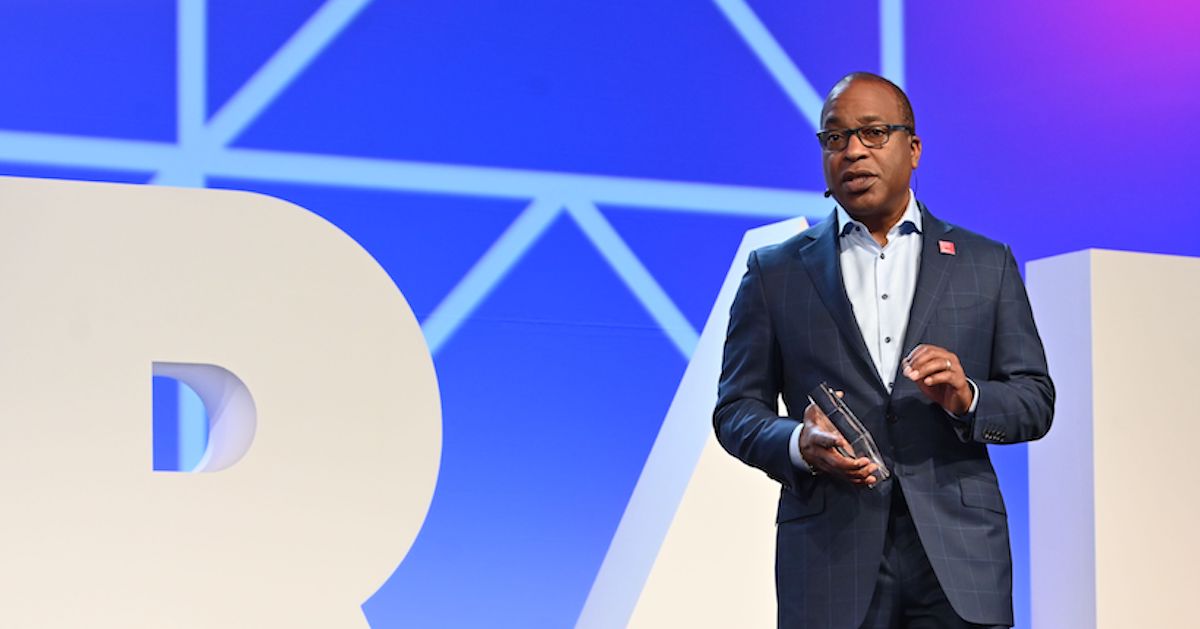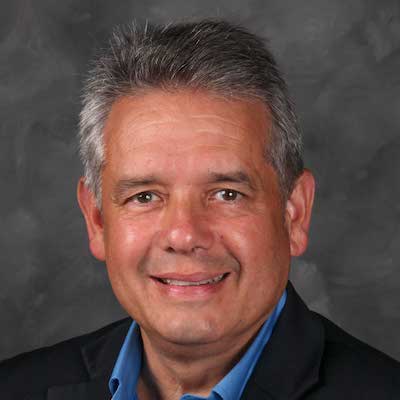Michael C. Bush has powerful memories of the life-defining lessons he learned from his father while growing up around Oakland, Calif.
Booker Bush was a self-employed carpenter with a no-excuse mentality, an entrepreneur of his time, who inspired his son to strive for excellence.
“I would see Leave It to Beaver and I never knew what Ward Cleaver did, but he would walk in with a suitcase and a suit, and I’m like, that’s what I want, you know, because that’s not the way my dad dressed nor nobody in my neighborhood,” Michael Bush tells The Meeting Professional. “I still don’t know what [Cleaver] did. But I was attracted to it. I remember that.”
Bush, encouraged by his father, developed an interest in business, reaching for the business section of the newspaper each day.
“My dad was about being your own person, no excuses, go and get it,” he says. “He used to say that God loves the child who’s got his own, so he was big on ownership. When I played sports, he would be like, ‘you don’t want to be playing sports, you want to own the team.’ He would say things like that just to deposit the idea of ownership in my mind.”
“Remember those things you’ve said over the past 14 months about your people needing to take care of their mental and physical well-being—that needs to continue.”
Bush would indeed embark on a career that had led to his role as owner and CEO of Great Place to Work, the global research and analytics firm that produces the annual Fortune 100 “Best Companies to Work For” list and a slew of other workplace rankings. He will be a keynote speaker at MPI’s World Education Congress (WEC), June 15-17 at CAESARS FORUM in Las Vegas.
His message is timely for the meeting, event and hospitality industry, which lost 5.6 million travel-related jobs in 2020, primarily due to the COVID-19 pandemic, according to new research rom the U.S. Travel Association and Tourism Economics. Even as business meetings begin to resume—WEC is the first major meetings industry conference to take place this year with in-person attendance—the industry is struggling to fill critical positions.
Bush was originally hired to help the founder of Great Place to Work exit the business. Within six months of taking control, Bush set goals that included a clear mission for the company: to build a better world by helping every organization become a “Great Place to Work For All” by the year 2030.
The company has expanded its research, producing additional coveted reports such as the “World’s Best Workplaces” list, the “100 Best Workplaces for Women” list, the “Best Workplaces for Diversity” list and more.
“Michael C. Bush has a perfect message for our industry at this time: how to create workplace cultures that attract and retain top talent,” says Annette Gregg, senior vice president for experience at MPI. “His company, Great Place to Work, is a global authority on workplace culture and since 1992 they have surveyed more than 100 million employees around the world and used those deep insights to define what makes a great workplace. We are excited to hear his insights on our mainstage.”
WEC Vegas, June 15-17, 2021. Make your future.
One of the hottest workplace culture topics these days revolves around telecommuting, which expanded for many workers in 2020 due the pandemic. While workplace efficiencies were achieved, the lack of face-to-face interaction is a driving force for bringing teams back together.
Bush, though, is urging CEOs to slow down. He published an article with the headline “DON’T do it!” with two recommendations for CEOs.
· Do NOT force your people back into the office. Your business will suffer because your people will suffer.
· If you must and you are in the U.S., think September. Let the summer pass.
“As a CEO or executive, a decision might make you feel better, maybe because it provides a way to signal progress through the pandemic or maybe because getting people back to the office gives you a feeling that finally you’ll be back in control,” Bush wrote. “That ‘getting back to business’ feeling will trick you into making short-sighted decisions that do not benefit your people.
“Make no mistake, there will be consequences to forcing the employee base back into the office; not the least of which will be an erosion of the trust you just spent the last 14 months building. When trust erodes, so does retention, innovation, inclusion and sense of belonging. Remember those things you’ve said over the past 14 months about your people needing to take care of their mental and physical well-being—that needs to continue.”

To be clear, Bush is not saying to not bring workers back together. While things will never be the way they were in 2019, people are going to be working in a more flexible way, and that flexibility matters.
“We survey 10 million employees a year, 10,000 companies a year, and we have no data to say that productivity is improved by having people in an office. None whatsoever,” he says. “As a matter of fact, 2020 data indicates the opposite. People were highly productive and put in a lot of work time and delivered high results. That’s why we have so many companies are doing so many amazing things.”
But bringing people together is needed for collaboration, innovation, morale and a sense of team.
“They matter,” Bush says. “Everybody knows that. So, the idea of, oh, we’re all going to go remote, nope. We’re still going to need for people to come together to make this special thing happen when human beings do it.”
The issue of vaccinated vs. non-vaccinated will be a safety factor for some, he says, and this will be a process to learn about over the next few months—a bit of “unknown, uncharted territory” until herd immunity takes effect.
Diversity and equity in the workplace are other issues of high interest to Bush. Since 2015, he has expanded Great Place to Work’s global mission to build a better world by helping organizations create great places to work not just for some but for all. Under his leadership, the firm has developed a higher standard of excellence that accounts for fair and equitable treatment of employees across demographic groups, as well as executive leader effectiveness, innovation and financial sustainability.
He spoke at the 2016 Conscious Capitalism CEO Summit, at which he said he changed GPTW’s mission to include “for all” at the end to refocus the company on its core values and take a second look at its data. Bush and his team found significant gaps between the experiences of executives and those on the front lines, such as between full- and part-time employees, men and women, white employees and employees of color.
“Humanity is built upon the obligations we have to one another, and we experience them when we’re together trying to achieve some common purpose.”
“I knew the power of maximizing the potential of every single person in the workplace,” he says. “I also knew the power of what drove innovation, which is having very, very, very different points of view, looking at a problem differently and hopefully having staff suggesting their ideas and then trusting one another so they can quickly be agile enough to implement the new idea.
“These are just good business things to drive something I care about very much, which is profit and earnings. In a company that has one dominant group, that company is in fact missing some different points of view that will help them in innovation. That company is, in fact, missing some top talent because you have just one dominant group predominantly in the company. Diversity is the best way to drive innovation and, I believe, financial performance.”
Fair and equitable terms of pay, opportunities for promotion and fairness and respect are all factors in creating an environment for great places to work, which will enable companies to outperform, he says.
Bush joined Great Place to Work in 2015, bringing 30 years of experience leading and growing organizations, including serving as CEO of Tetra Tech Communications, which he grew from $40 million to $300 million in revenue.
He serves on the board for Workday, a leading provider of enterprise cloud applications for finance, HR and planning. He is a former member of U.S. President Barack Obama’s White House Business Council and a founding board member of the private equity seed-fund Fund Good Jobs, which invests in small inner-city businesses.
His book, A Great Place to Work for All, outlines the compelling business and social benefits from his efforts to build a better world by helping organizations create great places to work not just for some but for all.
“I hope that we really all learned from 2020 that people coming together really matters,” he says, a message he plans to deliver at WEC. “Humanity is built upon the obligations we have to one another and we experience them when we’re together trying to achieve some common purpose. That’s part of why 2020 felt so miserable. We were unable to do that, something that we have habitually done and done throughout the history of the human race.
“I hope people cherish this coming back together and use their time more wisely as we come together …and how we treat each other. It sounds maybe hokey, but that’s the key to a great place to work—caring about one another and the obligations we can have with one another, really questioning biases that we might have. When you have people feeling like things aren’t fair, you are basically slowing the organization down, you’re slowing society down and you’re slowing your business down. Why would you do that? Why would you have that friction in the organization?
“So, caring for one another, which means all people, and creating and doing something in your company and hopefully in your life that really is about some higher purpose beyond just profit and loss. Because when you do that, you’ll realize that the problems of the world, the environment, social justice—they are so complicated, and we haven’t made a lot of progress. We need a new approach and I think the new approach is to let go of some of the things that we think we know and to interact with one another in a different way.”



